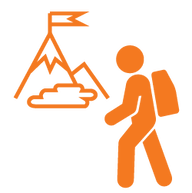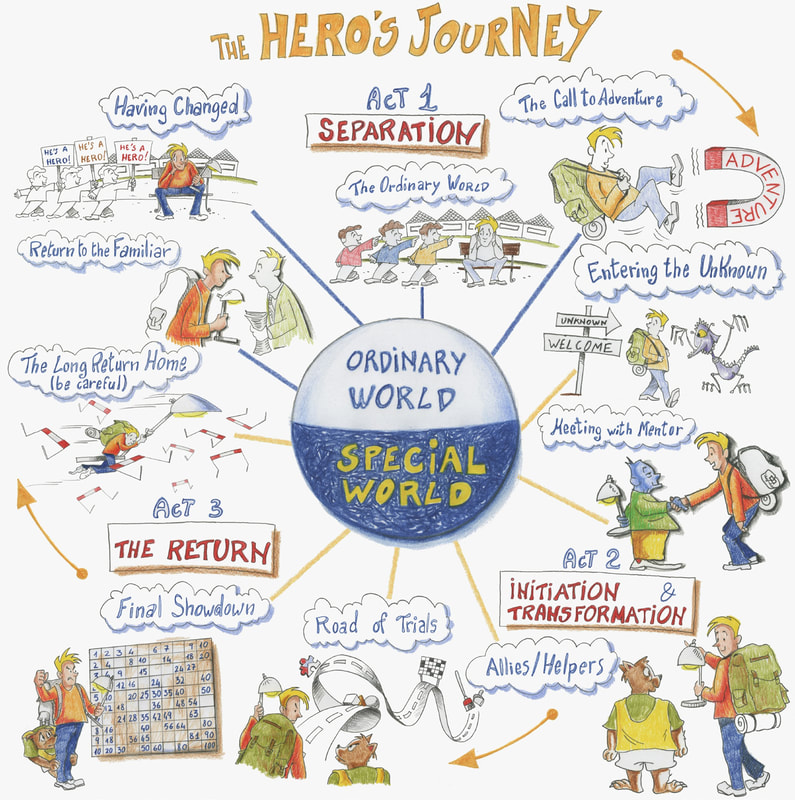What is the Hero's Journey?
The Hero’s Journey is a classic story structure found in ancient myths to modern novels, from religious to classical literature to drama to popular culture. The Hero’s Journey describes the path of a protagonist who heeds a call to adventure, leaves behind his or her known world, overcomes great opposition, and returns to the starting place having transformed. The greatest triumph is the change that takes place internally. This universal myth represents the original human drama that animates each individual’s journey through life.
Acton schools use this mono-myth to illustrate and explore the adventure of learning. Eagles learn that heroes are people who get up when they fall down. The basic question we ask ourselves on our journey is, “How can I use my talents in a way that brings me joy and serves others?” Being on a Hero’s Journey means actively seeking to answer that question.
Stages
Acton schools use this mono-myth to illustrate and explore the adventure of learning. Eagles learn that heroes are people who get up when they fall down. The basic question we ask ourselves on our journey is, “How can I use my talents in a way that brings me joy and serves others?” Being on a Hero’s Journey means actively seeking to answer that question.
Stages
- The Ordinary World: zone of comfort; living a status quo, everyday life
- Call to Adventure: a compelling event, request, or opportunity that urges the Hero to leave the zone of comfort in pursuit of something new, greater, or deeper
- Refusal of the Call: the internal struggle against the call to adventure, knowing the road ahead may be difficult
- Mentors & Allies: along the journey, the Hero meets mentors and allies who provide comfort, support, and wisdom
- Road of Trials: tests, tasks, or ordeals, usually presenting in a series and sometimes involving enemies, that the Hero must undergo to begin a transformation; often, the hero fails one or more of these
- Supreme Ordeal: the Hero is faced with a monumental challenge that seems impossible to overcome - the true test of heroic character - and emerges with triumph
- Transformation: having made discoveries or insights about oneself, the Hero experiences a profound change in consciousness, a change in the way the Hero views life
- Rebirth on the Road Back: during this process, the Hero of accepts the new transformed self
- Returning with the Elixir: the return to everyday life is difficult; the trick is to retain the Elixir...the wisdom gained on the journey...and to integrate that wisdom into life, and then share it with the world
What Does the Parent’s Journey Look Like?
Acton Academy Austin co-founder, Laura Sandefer shares her thoughts on a parent’s Hero’s Journey.
Lesson #1: Heroic parents are still learners.
This mindset changes everything. As a learner, I become a better listener, a curious seeker and an active player in daily life. My children are no longer vessels to fill and mold but mysterious wonders from whom I can discover great truths – even about myself. As a learner, I engage equally with my children in problem-solving, planning, even playing.
One of my favorite examples of a heroic parent came from an Acton mom. She told me the story of the day her son came home with a very low “360 score.” (Acton Academy’s peer review about kindness, servant leadership and overall community participation.) He was very upset which made the mom very upset. She kept thinking to herself, “This is too hard for kids! They can’t handle feedback like this! I think I’ll email Jeff and Laura.” But then she listened deeply – as a learner – to her son. He said, “Mom, I’m not upset about the feedback. It’s right! I’m mad at myself. I’m going to get better but right now I’m just mad.” If she had not listened and learned about his personal experience, she would have jumped in and tried to fix it. Her son is now one of the strongest servant leaders we have on campus.
Joseph Campbell described living the Hero’s journey as a life lived in self-discovery. What a wondrous twist on parenting.
Lesson #2: Heroic parents respond with gratitude when their children are held accountable for their choices.
It’s not that they are happy about it. It’s that they know their children will be better off in the long run if they learn to deal with mistakes, problems and failures now when the stakes are relatively low.
In contrast, ordinary parents blame the school (or whatever/whomever) and aim to lessen the consequences their child would otherwise experience.
One of my favorite examples of this kind of extraordinary/heroic parenting came from an Acton dad recently. When we informed him that his son had cheated on tracking his points for his work, his response was brilliant. He said, “Good. Better to learn the consequences of lying now than later on his tax returns.”
Call to action: The next time your child comes home with a strike, honor code violation or low 360 score (Acton’s accountability processes,) take a deep breath and say to yourself, “Good. This is exactly what I was waiting for. An excellent learning moment.”
Lesson #1: Heroic parents are still learners.
This mindset changes everything. As a learner, I become a better listener, a curious seeker and an active player in daily life. My children are no longer vessels to fill and mold but mysterious wonders from whom I can discover great truths – even about myself. As a learner, I engage equally with my children in problem-solving, planning, even playing.
One of my favorite examples of a heroic parent came from an Acton mom. She told me the story of the day her son came home with a very low “360 score.” (Acton Academy’s peer review about kindness, servant leadership and overall community participation.) He was very upset which made the mom very upset. She kept thinking to herself, “This is too hard for kids! They can’t handle feedback like this! I think I’ll email Jeff and Laura.” But then she listened deeply – as a learner – to her son. He said, “Mom, I’m not upset about the feedback. It’s right! I’m mad at myself. I’m going to get better but right now I’m just mad.” If she had not listened and learned about his personal experience, she would have jumped in and tried to fix it. Her son is now one of the strongest servant leaders we have on campus.
Joseph Campbell described living the Hero’s journey as a life lived in self-discovery. What a wondrous twist on parenting.
Lesson #2: Heroic parents respond with gratitude when their children are held accountable for their choices.
It’s not that they are happy about it. It’s that they know their children will be better off in the long run if they learn to deal with mistakes, problems and failures now when the stakes are relatively low.
In contrast, ordinary parents blame the school (or whatever/whomever) and aim to lessen the consequences their child would otherwise experience.
One of my favorite examples of this kind of extraordinary/heroic parenting came from an Acton dad recently. When we informed him that his son had cheated on tracking his points for his work, his response was brilliant. He said, “Good. Better to learn the consequences of lying now than later on his tax returns.”
Call to action: The next time your child comes home with a strike, honor code violation or low 360 score (Acton’s accountability processes,) take a deep breath and say to yourself, “Good. This is exactly what I was waiting for. An excellent learning moment.”



